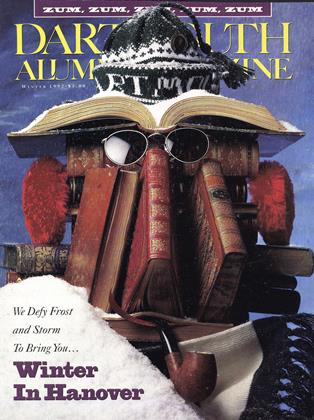TO DATE, Dartmouth's major academic computing achievements focus on a suite of information-seeking programs collectively called DCIS, for Dartmouth College Information Services. One program, Navigator, displays a list of all the academic resources available from the network. When a user clicks on an item in the list, Navigator automatically launches the correct program to access that particular information. The data cover more than humanities and bibliographic material. The College is working to collect geographic data, and it serves as a government document depository, all in machine-readable form.
"The pipeline has been built," said Brown of the DCIS suite of utilities. "Now we have to turn the spigot on. Once we get a lot of full text in there, it will really take off. So my job now is to talk to the faculty to see what water should be going in the pipes."
Most of that information is still in printed form. Transferring the words to a digital format is costly and time-consuming "and not worth doing unless you're going to do it right," according to Brown. The average book costs Dartmouth about $1,000 to put online. And then there are copyrights. As yet, publishers are reticent to allow their materials to be spread around electronically, and understandably so. They could lose their shirts if everyone simply copied text from library sources. "The number of copyright issues is huge," noted Bruce Pipes. "Publishers don't know what they want to do just yet." Meanwhile, the first material to go into DCIS is owned by Dartmouth or in the public domain. The materials that are coming online are coming slowly.
 View Full Issue
View Full Issue
More From This Issue
-
 Feature
FeatureKnow Your Place
December 1992 By George J.Demko -
 Feature
FeatureCure1 For The Common Cold2 Proven3 At Dartmouth4!
December 1992 By TIG TILLINGHAST '93 -
 Cover Story
Cover StoryThe Library Culture
December 1992 -
 Cover Story
Cover StoryThe Ether Library
December 1992 -
 Cover Story
Cover StoryRethinking The Stacks
December 1992 By Tig Tillinghast '93 -
 Cover Story
Cover StoryWith Hard-bound Books, Who Needs Digital?
December 1992








